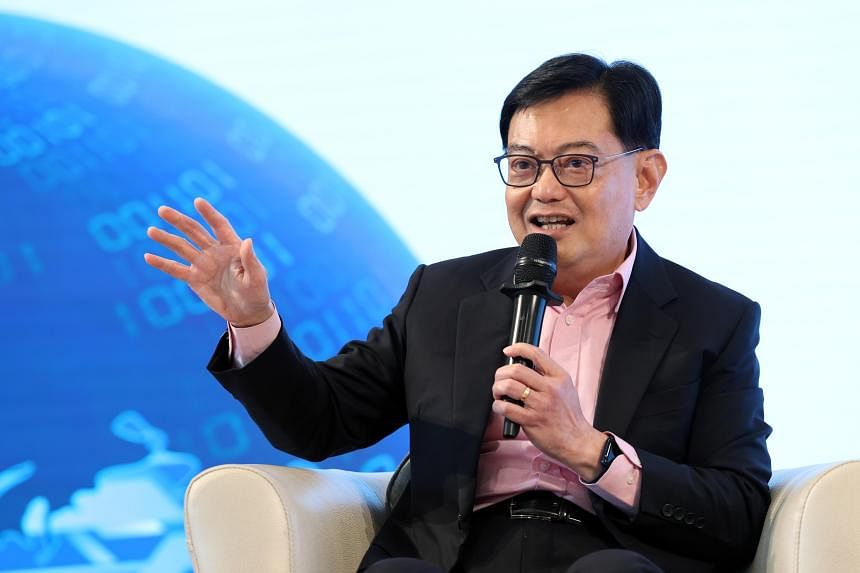- Joined
- Oct 30, 2014
- Messages
- 36,768
- Points
- 113

SINGAPORE – The support measures in Budget 2024 are not meant to increase Singaporeans’ reliance on the Government, but to help them upskill and upgrade.
Speaking in Mandarin, Deputy Prime Minister Heng Swee Keat said: “Many of our support measures encourage our people to upskill themselves. As the saying goes, if you give a man a fish, it will only last one day. If you teach a man to fish, it will last forever.”
DPM Heng, who is also Coordinating Minister for Economic Policies, was responding to a question at the Mandarin fireside chat titled “Survival and Challenges Singapore faces in this ever-changing world”, organised by the Teochew Federation on March 11.
It was moderated by Ms Lee Huay Leng, editor-in-chief of SPH Media Trust’s Chinese Media Group. About 160 attendees, including business and community leaders, attended the inaugural event at Chui Huay Lim Club at Keng Lee Road in Newton.
Budget 2024 was delivered by Deputy Prime Minister and Minister for Finance Lawrence Wong on Feb 16.
Under the SkillsFuture Level-Up Programme, for example, a $4,000 SkillsFuture credit top-up will be given to Singaporeans aged 40 and above in May. The credit can be used for about 7,000 part- and full-time courses designed to generate better employability outcomes.
DPM Heng noted that in countries such as the United States, the idea of “universal basic income” is being explored, in which citizens receive a set amount of money regularly as automation increasingly replaces workers in some sectors of the economy.
In Singapore, however, the Government is looking at ways of equipping the workforce with artificial intelligence (AI) skills instead.
For example, during the debate on her ministry’s budget on March 1, Communications and Information Minister Josephine Teo announced schemes to give Singapore’s workforce an edge in the future of AI. These include allocating up to $500 million to secure advanced computer chips to provide the infrastructure needed to power AI innovation in the private and public sectors.
Though Singapore is a small economy, it is also nimble, and was among the first to bounce back from the Covid-19 pandemic, said DPM Heng.
Many Singapore businesses have expanded overseas, including China, which is facing multiple challenges such as trade tensions with the US, a widening gap between the rich and the poor and an ageing society. It is looking into economic transformation and technological innovation to stay ahead.
Urging local companies to adopt a long-term perspective, DPM Heng said: “No country’s economy is constantly on the rise. What’s important is whether they are determined to grow.”
There is a need to exercise prudence when using the nation’s reserves, said DPM Heng. Beyond the Government’s support measures to help citizens cope with inflationary pressures, Singaporeans should also help those who are disadvantaged in the community, such as the 14,000 lower-income families in rental housing under the ComLink scheme.
“Some people asked if the GST (goods and services tax) rate can be raised to 10 per cent instead of 9 per cent, so that there is more revenue to help the needy,” he said. “This is not the way because we want to build a compassionate society where those who can, help the disadvantaged.”
Not growth at all costs: Budget 2024 invests in improving social mobility
To this end, he urged the Teochew community, which has been active in preserving its culture, to extend the concept of “Teochew nang, kaki nang” (Teochew person, one of us) to “Singapore nang, kaki nang” (Singaporeans, one of us) and work with other dialect groups and ethnicities to continue helping the Singapore community, and build a unique local culture.
“If a child growing up in Singapore can have a multicultural view, interacting with different countries, ethnicities and religions, he can survive anywhere,” DPM Heng said.
As they also interact with those from other countries, he cautioned that “national identity should come before cultural identity”.
Separately, DPM Heng was asked by Ms Lee at the end of the hour-long fireside chat if the general election will be held in 2024.
To this, DPM Heng did an informal poll among the audience, the majority of whom raised their hands when asked if the general election will be held in 2024. Most of the members of the audience also believed that having the general election in 2024 is in the ruling party’s favour, and that DPM Heng will win in his East Coast GRC ward again.
On the election date, DPM Heng said: “It may be this year or next. You have to ask the Prime Minister.”
On whether he will still contest in East Coast GRC, his reply was: “It’s up to the party to decide.”
Mr Heng, who came from a poor family but managed to get into the University of Cambridge on a scholarship, said he joined politics as one must “think of the source when drinking water”.
“Besides helping to give the youth more opportunities, I hope to take care of the elderly in our ageing society,” he said.
https://www.straitstimes.com/singap...ase-s-poreans-reliance-on-government-dpm-heng




